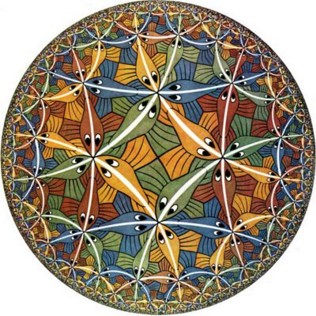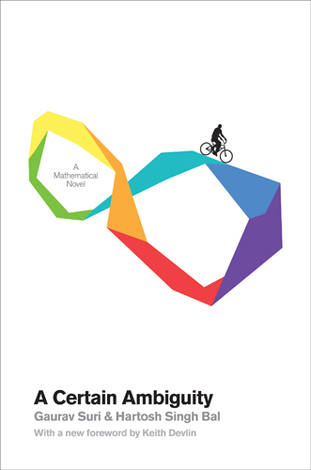A Certain Ambiguity
I recently read the 2007 novel A Certain Ambiguity, one of several mathematically-influenced gifts I received for Christmas. Written by Gaurav Suri and Hartosh Singh Bal, the novel explores the certainty of knowledge through the prisms of mathematics and religion. The story is told through from the perspective of a Stanford undergraduate, whose grandfather was a mathematician and who, it is discovered (spoiler alert!), was arrested in the early twentieth century under a blasphemy law in New Jersey for remarks he made against organized religion.
The grandson, Ravi Kapoor, delves into this mysterious part of his grandfather's past while taking a mathematics class analogue of "Physics for Poets" - in other words, a math class aimed at non-mathematics students. The story jumps between classroom discussions and fictionalized historical records in an attempt to make clear the beauty of mathematics and give insight into the quest for truth (including, but not limited to, mathematical truth).
The cover of the book describes it as "A Mathematical Novel" - to many, this may seem like an oxymoron. In the preliminary author's note, they elaborate by stating the following:
Our principal purpose in writing A Certain Ambiguity is to show the reader that mathematics is beautiful. Furthermore, we seek to show that mathematics has profound things to say about what it means for humans to truly know something. We believe that both objectives are best achieved in the medium of a novel. After all it is human beings who feel beauty and it is human beings who feel the immediacy of philosophical questions. And the only way to get human beings into the picture is to tell a story.
But does the novel achieve it's goals? I'm not so sure that it does.
From a mathematical standpoint, the book does a good job of introducing and developing mathematical concepts for a general audience. For the math newbie, this book discusses Zeno's paradox, the irrationality of $latex \sqrt{2}$, Cantor's diagonalization argument, and some non-Euclidean geometry, just to name a few. It also delves into the history of many mathematical discoveries, and tries to explore the personalities of those who have contributed to our collection of mathematical knowledge.

A mention of non-Euclidean geometry gives me an excuse to link to an Escher drawing. Click through to try and discover the connection!
This is all well and good. The problem is that this frequently gets in the way of the narrative. It is clear that the authors have a passion for mathematics, but it's less clear that they have a passion for storytelling. Ravi's story sometimes seems to serve only as an inconvenient bridge that needs to be crossed in order to move from one mathematical discussion to another. Also, there are several fictionalized journal entries from long deceased mathematicians (these are what personalize the history of mathematics), but these frequently serve no purpose in the larger story.
Even Ravi's story diverges into areas that don't really seem to matter. A romantic subplot with one of his classmates is hinted at here and there, and the novel makes it clear that this girl Ravi is crushing on eventually becomes his wife, but their relationship during the events described in the book never really evolves, and because of this, it's difficult to care about the fact that they eventually married.
I most enjoyed the historical records chronicling Ravi's grandfather's arrest, and subsequent discussions with a judge tasked to determine whether or not the blasphemy case should go to trial. On the whole, though, the book felt like a bunch of mathematical vignettes aimed for those with little mathematical exposure, loosely strung together by a contemporary story. Ravi's desire to discover his grandfather's past is the most compelling part of said story, and deals the most closely with humanity's quest for truth, but ultimately isn't enough to salvage the narrative.
Unfortunately, the authors don't quite seem to strike the balance they are looking for. In the end, the book is more of a MATHEMATICAL (novel) than a mathematical novel. Even so, if you have this knowledge going in, there is enough here to make it a worthwhile read. If you read only one mathematical novel this year, though (and who among us doesn't read at least one?), I'd recommend Logicomix first.
Psst ... did you know I have a brand new website full of interactive stories? You can check it out here!
comments powered by Disqus

